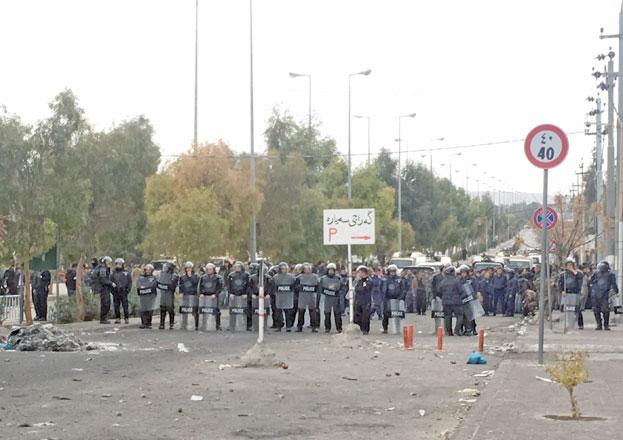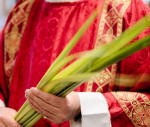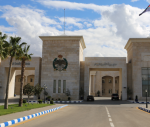You are here
Kurdish protesters set fire to party offices in northern Iraq
By Reuters - Dec 19,2017 - Last updated at Dec 19,2017

Smoke rises as demonstrators set a state building on fire 45 kilometres from the Kurdish-controlled city of Sulaymaniyah, within anti-government protests in Iraq on Monday (Anadolu Agency photo)
SULAIMANIYAH, Iraq — Kurdish protesters, angered by years of austerity and unpaid public sector salaries, set fire to the offices of political parties near the city of Sulaimaniyah on Monday, demanding that Iraq’s semi-autonomous Kurdistan Regional Government (KRG) quit.
Social media footage showed a building belonging to the ruling Kurdish Democratic Party (KDP) on fire and a spokesman for its coalition partner in government, the Patriotic Union of Kurdistan (PUK), told Reuters an office belonging to them was also set ablaze by protesters.
Two other party offices were torched, local media reported. Reuters was able to independently verify only those fires at the KDP and PUK offices, but Iraqi state television reported that the offices of several Kurdish political parties had been set on fire, without naming the parties.
Tension has been high in the region since the central government in Baghdad imposed tough measures when the KRG unilaterally held an independence referendum on September 25 and Kurds voted overwhelmingly to secede.
The move, in defiance of Baghdad, also alarmed neighbouring Turkey and Iran who have their own Kurdish minorities.
At least 3,000 Kurdish demonstrators had gathered in Sulaimaniyah for the protests on Monday against the KRG.
Men and women carried signs in Kurdish, Arabic, and English telling the executive and legislative branches of the KRG that they wanted them gone, holding up red cards to further make their point.
“Stop 26 years of robbery and wrong decisions,” one read.
Teachers, hospital workers and other public sector employees demanded the regional government pay their wages. Some said they had not been paid in more than three years.
“These protests are different from earlier ones because the Kurdish public are not asking the government for something, they are asking the executive and legislature to leave,” said protester Kameran Gulpi.
In the decade following the 2003 US-led invasion of Iraq, Kurdistan insulated itself against violence plaguing the rest of the country and enjoyed an economic boom fuelled by rising Iraqi oil revenues, of which the region received a share.
The bubble began to deflate in early 2014 when the Baghdad central government slashed funds to the KRG after it built its own oil pipeline to Turkey in pursuit of economic independence.
After the September referendum, the Iraqi government responded by seizing Kurdish-held Kirkuk and other territory disputed between the Kurds and the central government. It also banned direct flights to Kurdistan and demanded control over border crossings.
Related Articles
SULAIMANIYAH — Three people were killed and more than 80 wounded as Kurdish protesters, angered by years of austerity and unpaid public sect
ERBIL, Iraq — Three people were killed in a third day of violent unrest in Iraq's Kurdistan region on Saturday, as protesters attacked and t
BAGHDAD, Iraq — The semi-autonomous Kurdistan region of northern Iraq, which voted overwhelmingly in favour of independence last year in a r

















